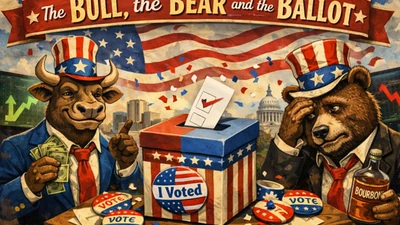In an increasingly interconnected world, the pulse of the global economy often beats through the intricate dance of currency exchange rates. For those with a prudent eye and a commitment to understanding fundamental economic principles, currency investing—often known as Forex (Foreign Exchange)—can appear as both an opportunity and a cautionary tale. From a conservative viewpoint, engaging in currency markets is less about reckless speculation and more about discerning sound economic stewardship amidst the ebb and flow of international finance.
Understanding the Battlefield: What is Currency Investing?
At its core, currency investing is the act of exchanging one nation's currency for another, aiming to profit from the subtle shifts in their relative values. Unlike stocks or bonds, you're not buying a piece of a company or lending money to a government; you're trading the very medium of global commerce. Currencies are always traded in "pairs," such as EUR/USD (Euro versus U.S. Dollar), where the first currency is the "base" and the second is the "quote." When you buy EUR/USD, you're essentially buying Euros and simultaneously selling U.S. Dollars, betting that the Euro will strengthen against the Dollar.
The Forex market is the largest and most liquid financial market in the world, operating 24 hours a day, five days a week. Transactions occur "over-the-counter" (OTC) directly between participants, rather than on a centralized exchange. Profits are made from the "spread" between the bid (buy) and ask (sell) price, or through the appreciation of one currency against another.
The Conservative Lens: Prudence, Principle, and Preservation
For the discerning investor, a conservative approach to currency investing emphasizes discipline, foundational knowledge, and a healthy skepticism of excessive risk.
- Fiscal Discipline and Sound Money: A cornerstone of conservative economic thought is the belief in fiscal responsibility. A nation's currency is, in many ways, a direct reflection of its economic health and the prudence of its government. Currencies of countries with stable governments, manageable debt levels, controlled inflation, and strong, productive economies tend to be more resilient and attractive. Conversely, nations with profligate spending, mounting debt, and inflationary monetary policies will inevitably see their currency weaken.
Therefore, a conservative investor studying currency pairs will prioritize the fundamental economic data:
- Interest Rates: Set by central banks, higher interest rates often attract foreign capital, as investors seek better returns on their savings and investments. This increases demand for the currency, strengthening it.
- Inflation: High and uncontrolled inflation erodes purchasing power, making a currency less desirable. Stable, low inflation is a hallmark of a strong currency.
- GDP and Employment: Robust economic growth and low unemployment signal a healthy economy, bolstering confidence in its currency.
- Trade Balances: A nation that exports more than it imports (a trade surplus) typically sees greater demand for its currency.
- Government Debt and Stability: High national debt and political instability are often precursors to currency depreciation as confidence wanes.
- Skepticism of Excessive Leverage: Forex trading often involves significant leverage, allowing investors to control large positions with a relatively small amount of capital. While this amplifies potential gains, it equally amplifies potential losses. A conservative perspective cautions against the allure of excessive leverage, recognizing it as a direct path to magnified risk. True wealth is built through careful accumulation and prudent management, not through gambling on outsized bets.
- Focus on Fundamentals, Not Just Fads: While technical analysis (studying price charts and patterns) has its place, a conservative investor will anchor their decisions in economic fundamentals. Chasing fleeting trends or relying solely on speculative "gut feelings" is antithetical to responsible wealth management. Understanding the underlying economic conditions and policy decisions of the respective nations in a currency pair provides a more stable and defensible investment thesis.
- Avoiding Government Manipulation (Where Possible): Conservative thought often views government intervention in markets with a wary eye. Central banks, through monetary policy (like quantitative easing or interest rate manipulation), can heavily influence currency values. While these actions are part of the market, a conservative investor will be acutely aware of how such interventions might distort natural market forces, affecting long-term currency stability and value. They would prefer currencies underpinned by genuine economic strength rather than artificial government propping.
The Practicalities: How It Works for the Individual
For the individual investor looking to engage in currency markets, several avenues exist, each with varying levels of risk and involvement:
- Spot Forex Trading Accounts: This is the most direct method, involving opening an account with a Forex broker. You trade currency pairs in real-time based on current market prices. This offers the most control but also the highest risk due to leverage and volatility.
- Currency Exchange-Traded Funds (ETFs) and Exchange-Traded Notes (ETNs): These financial instruments trade on traditional stock exchanges and offer exposure to a basket of currencies or a single currency's performance against another, often without the high leverage of direct Forex accounts. They provide a more diversified and often less hands-on approach.
- Foreign Bond Funds or Multinational Corporations: Indirectly, investing in mutual funds that hold foreign government bonds or buying stock in large multinational corporations with significant overseas operations can also provide exposure to currency fluctuations. Their earnings and asset values are influenced when foreign currencies are converted back to their home currency.
- Foreign Currency CDs/Savings Accounts: Some financial institutions offer Certificates of Deposit or savings accounts denominated in foreign currencies. While potentially offering higher interest rates, they expose your principal to exchange rate fluctuations.
In conclusion, currency investing, when approached with a clear mind and conservative principles, is an exercise in economic discernment. It's about recognizing that a nation's currency is a testament to its economic discipline, its commitment to sound fiscal policy, and its embrace of productive enterprise. For those willing to do their homework and resist the siren song of excessive speculation, the global currency market offers a fascinating, albeit challenging, arena for informed investment. It is a reminder that in finance, as in life, prudence, a focus on fundamentals, and a healthy respect for risk are often the surest path to enduring value.










